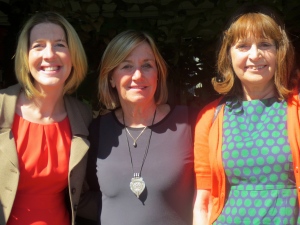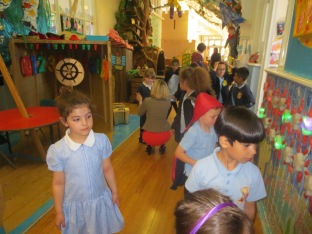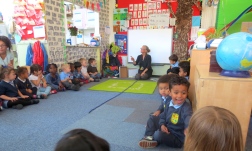
Louisa Munro-Morris, a recently appointed Principal to Landsdowne Primary School in Cardiff is implementing a strategy for radically reforming the Foundation Stage. This included a pirate ship being the location of the Numeracy program.
Louisa is a trained Philosophy teacher and currently completing her PHD on Philosophy and Children. She is keen to embed Philosophy throughout the school and all teachers in the Foundation Stage have completed a two day SAPERE training course in Philosophy with Children. She has engaged mentors to regularly visit the school to observe and support the teachers as they move away from a prescriptive program to the Story Telling Curriculum. The seven classes within the Foundation stage work closely together to support each other in this new curriculum. Louisa and Kathy, the head of the Foundation Stage, were very open about the problems they have and do encounter trying to change direction and particularly the resistance from the traditional teachers to the changes to what is already in place. I have consistently observed that change and innovation starts at the top: visionary leaders supporting those teachers who take the challenge to change and working around those teachers who may never be open to change.

With great pride I was taken to the Pirate Ship. Here in the corridors where once coats and bags were hung was a shared Numeracy centre was built ‘out of bits and pieces’. Here amongst the anchors, ladders, ship lockers and treasure chests lay the Maths Centre which served all seven Foundation classes. No longer do teachers have to pack and unpack resources as they are stowed in ‘treasure chests’ awaiting the next band of pirates. Bags of gold have replaced counters, kitchen scales show the tilt of the keel, treasure maps showed the coordinates for the dig, places to weigh and measure fish, a ship’s bell for recording time to complete tasks and an innovative octopus for calculation and pattern matching. Individual class teachers continue to discover new ways to use the ship to explore mathematical concepts within this shared location. This ‘built from bits and pieces’ project firmly places Maths within the real world.
I observed a philosophy lesson in the Nursery Class. The teacher presented a lesson on classifications – a useful philosophic tool – giving the children images of cities and country to place within the two defined categories that were separated by a rope.

I noted the difficulty the teacher had in giving all children a voice, the difficulty of engaging the whole class in the activity and the difficulty of converting and extending the preliminary activity into a critical inquiry.
This was a valuable experience making me reflect on what elements of the Philosophy program would be most valuable in difficult environments particularly where many children do not have English as a first language and and how best to support teachers who want to change from an adult–directed style of interacting with children to a more collaborative environment.
I have an abundance of food for thought and I look forward to a few days off this coming weekend to reflect more on what I have seen. Off to London tomorrow.
